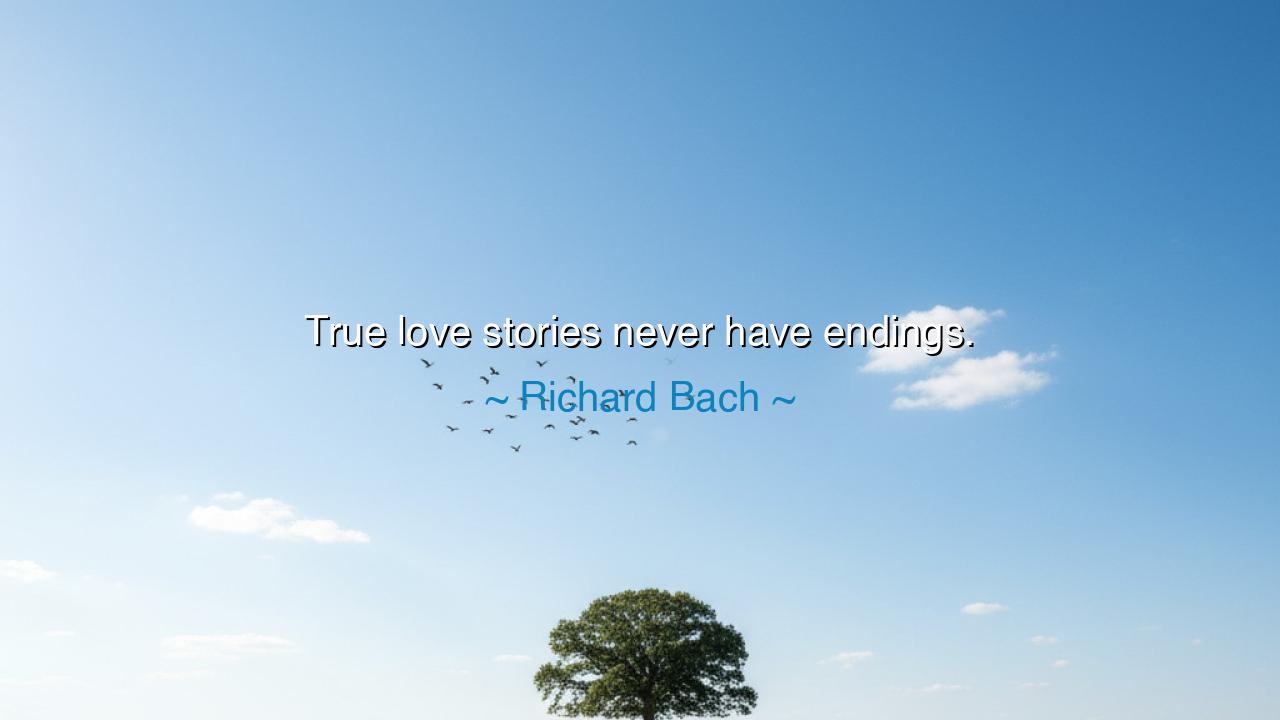
True love stories never have endings.






"True love stories never have endings." Thus wrote Richard Bach, the dreamer of the skies and the philosopher of the spirit, whose words soared beyond the limits of the earth. In this brief yet eternal phrase, he reveals a truth as old as creation itself—that true love is not bound by time, nor limited by death, nor measured by distance. What is born of the soul cannot perish with the body; what is woven by the divine cannot be undone by the world. For love, when it is pure and selfless, transcends all endings, transforming every farewell into a beginning, every loss into remembrance, and every silence into a deeper song.
The origin of this wisdom lies in Bach’s lifelong belief in the immortality of the soul and the continuity of connection. As the author of Jonathan Livingston Seagull and The Bridge Across Forever, he often spoke of love not as a fleeting emotion, but as an eternal bond—a meeting of spirits that endures beyond the passage of days. His quote, “True love stories never have endings,” emerged from this vision of love as a spiritual journey, one that continues across lifetimes. For Bach, the story of love is not written in the ink of time but carved into the eternal heart of being itself.
When he speaks of “true love,” he does not mean the easy affection of comfort or the shallow warmth of desire. He speaks of the love that refines rather than consumes, that seeks the good of the other even at cost to itself. Such love does not end when life changes or when people part; it continues to live in memory, in growth, and in transformation. Love’s true story is written not in what happens, but in what remains—how it changes us, how it expands us, how it teaches us to see the divine in another soul. Endings belong to stories of possession; eternity belongs to stories of love.
Consider the love of Antony and Cleopatra, whose passion defied kingdoms and whose devotion endured even in death. Though their lives ended in tragedy, their love became immortal, preserved in poetry, legend, and the collective heart of humanity. Their story did not end upon their last breath; it transcended it, living on as symbol and myth, as testimony to the power of love that refuses to fade. Or think of Romeo and Juliet, whose brief union birthed centuries of reflection on the cost and beauty of love. Their earthly story ended, yes—but their true love story became timeless, whispered across generations, immortal in its message: that love, when real, leaves an imprint that eternity itself cannot erase.
But Bach’s wisdom need not dwell in the grand tales of history—it lives also in the quiet, ordinary lives of those who love deeply and faithfully. The mother who still feels her child’s presence long after death; the lover who honors the memory of their beloved with kindness; the friend whose bond outlasts time and distance—all these are proofs of what Bach proclaimed. For every act of love, however small, joins the eternal current that flows through all souls. It cannot die, for it was never born in the body; it was born in the spirit.
There is also a deeper mystery within this saying: that true love is not dependent on the loved one’s presence, but on the lover’s heart. The story of love continues in the way it shapes us, makes us gentler, wiser, more compassionate. Even when the beloved departs—by fate, by choice, or by death—the love remains as light within us. It becomes the melody that guides our steps, the unseen strength that makes us whole. To love truly is to awaken to eternity itself, to touch the divine that lives in all things.
And so, my listener, take this teaching into your heart: if your love is true, it will never end. Do not mourn the closing of a chapter, for the story continues in another form. Every genuine act of love—every forgiveness, every kindness, every sacrifice—joins the everlasting tale of the soul’s journey toward unity. To love well is to live beyond time. Therefore, love courageously, love purely, love without fear of endings, for endings are but the disguises of eternity.
For in the end, Richard Bach’s truth stands as both comfort and challenge: to love not as the world loves—conditionally, temporarily—but as heaven loves—without measure, without boundary, without end. Let your life itself become a love story that never finishes, one that echoes through generations, carried not in words, but in the legacy of the heart. For all things may fade, but true love, once awakened, endures forever, unbroken, unending—an eternal flame in the boundless sky of the soul.






AAdministratorAdministrator
Welcome, honored guests. Please leave a comment, we will respond soon